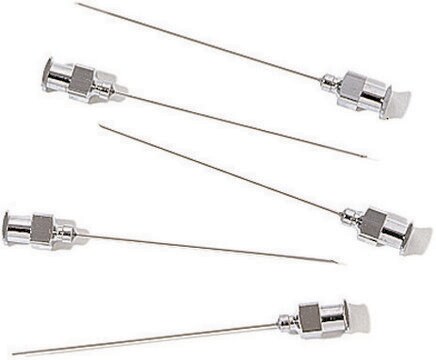Z108782
Stainless steel 304 syringe needle
gauge 16, L 6 in.
Zaloguj sięWyświetlanie cen organizacyjnych i kontraktowych
About This Item
Kod UNSPSC:
42142600
eCl@ss:
32070500
NACRES:
NB.03
Polecane produkty
opis
Standard Hub with 304 Stainless Steel Tubing
opakowanie
pack of 1 ea
producent / nazwa handlowa
Popper 7046
Długość
6 in.
grubość
16
Szukasz podobnych produktów? Odwiedź Przewodnik dotyczący porównywania produktów
Opis ogólny
304 SS needle with chrome-plated brass Luer hub. Needle is designed with a slightly curved, deflecting tip to prevent coring during needle insertion through the septum.
Standard Hub with 304 Stainless Steel Tubing
Standard Hub with 304 Stainless Steel Tubing
Ta strona może zawierać tekst przetłumaczony maszynowo.
Wybierz jedną z najnowszych wersji:
Certyfikaty analizy (CoA)
Lot/Batch Number
It looks like we've run into a problem, but you can still download Certificates of Analysis from our Dokumenty section.
Proszę o kontakt, jeśli potrzebna jest pomoc Obsługa Klienta
Masz już ten produkt?
Dokumenty związane z niedawno zakupionymi produktami zostały zamieszczone w Bibliotece dokumentów.
Klienci oglądali również te produkty
Pingxi Xu et al.
Insect biochemistry and molecular biology, 113, 103224-103224 (2019-08-26)
In addition to its primary function as an insect repellent, DEET has many "off-label" properties, including a deterrent effect on the attraction of gravid female mosquitoes. DEET negatively affects oviposition sites. While deorphanizing odorant receptors (ORs) using the Xenopus oocyte
WeiYu Lu et al.
PloS one, 12(12), e0189243-e0189243 (2017-12-15)
The insect repellent N,N-diethyl-3-methylbenzamide (DEET), is a multimodal compound that acts as a spatial repellent as well as an irritant (contact repellent), thus being perceived by the insect's olfactory and gustatory systems as an odorant and a tastant, respectively. Soon
Fangfang Zeng et al.
Insect biochemistry and molecular biology, 113, 103213-103213 (2019-08-24)
Mosquitoes rely heavily on the olfactory system to find a host for a bloodmeal, plants for a source of energy and suitable sites for oviposition. Here, we examined a cluster of eight odorant receptors (ORs), which includes one OR, CquiOR1
Nasz zespół naukowców ma doświadczenie we wszystkich obszarach badań, w tym w naukach przyrodniczych, materiałoznawstwie, syntezie chemicznej, chromatografii, analityce i wielu innych dziedzinach.
Skontaktuj się z zespołem ds. pomocy technicznej



